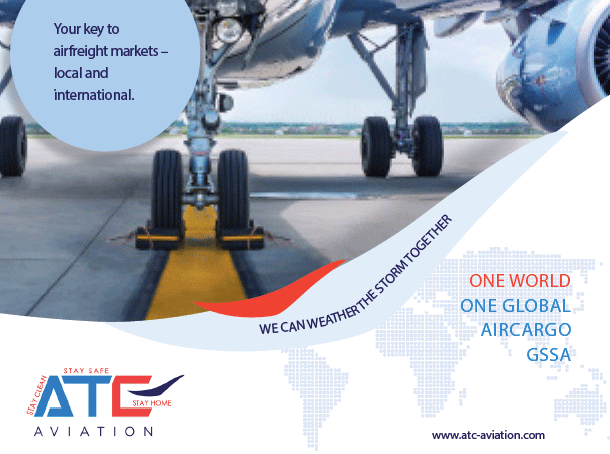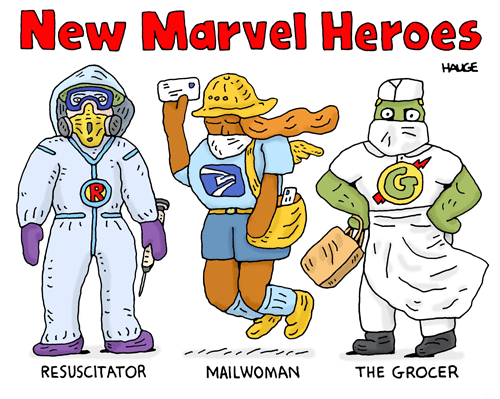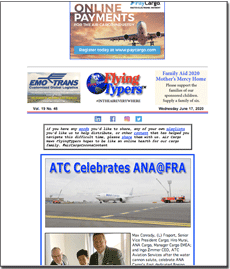|
While most of the conversation lately has
centered on what the world of airlines, forwarders and other players in
air cargo will look like moving ahead, here are some thoughts from Dan
Muscatello, an expert in airport Cargo and Logistics strategy and planning.
Dan brings an impressive portfolio of more
than 40 years of experience, in both the public and private sectors.
He has been a development strategist for
both the business and physical facility planning of air cargo complexes,
and the integration of ancillary and supporting logistics services and
what make airport air cargo operationally and financially feasible.
So here we are in the midst of the COVID-19
global challenge, with an airport air cargo perspective from “Dan,
the Airport Cargo Man,” offering some plain talk about challenges
that are confronting airports as well as some solutions for happy landings,
financially and strategically moving ahead in 2020.
Out Of Control Change
“The main issue for airports,”
Dan contends, “is that so much of future cargo operations is beyond
their control.
“It’s important to note that
airports in general, and airport organizations have developed detailed
plans for how to protect personnel involved with the handling of cargo.
But the problem in the changing logistics landscape that they are now
facing, is figuring out if and how the cargo will arrive at their airport.
Airlines have reduced their passenger operations by as much as 90% or
more, and major routes have been scaled back. The result is that many
of these remaining flights are extremely dependent on belly cargo for
revenue, and a number of passenger aircraft have been converted to freighters.
While we all believe that these situations will begin to reverse themselves,
it may be several years before things begin to settle into a new normal.
“The airlines have recently been allocated
a $25 billion part grant, part loan bailout to help with their recovery.
Airports, that are of course dependent on the carriers for revenue, received
$10 billion in federal Airport Improvement Program (AIP) grants in the
two trillion-dollar stimulus bill passed in March. These funds will be
distributed to airports utilizing existing formulas.
“The American Association of Airport
Executives indicated that the infusion will assist airports that are "reeling
from the impacts of coronavirus and the precipitous decline in travel
that has occurred in a matter of a few short weeks." The money is
intended to help retain staff, avoid defaults on bonds, deliver key capital
programs, and assist with recovery efforts. While this seems like a substantial
boost, it must be put in context.
“Earlier this year, the Airports Council
International estimated that North American airports will have approximately
$125 billion in infrastructure needs that must be addressed over the next
five years. When combined with the recent, ongoing, and projected future
losses, the deferral of non-critical maintenance, and the reductions in
traffic, the future will be lean. It therefore becomes imperative that
airports identify every opportunity to enhance revenues and reduce costs
for themselves, and their partners.
“It seems unlikely that passenger
volumes and revenues will see 2019 levels for years. The virus will have
a scarring effect on many potential business and leisure travelers. New
vacation destinations reachable by car will become more popular and fewer
people will be inclined to wander too far from home. Businesses will have
developed a new reliance on video conferences and the facilities for this
type of communication have expanded exponentially in the present crisis;
the very demonstrable cost and time savings will have an impact on business
travel.
“Overarching these considerations
is the financial aspect that will severely curtail travel by air for a
population that has taken a heavy hit. It’s also very likely that
as we emerge from the pandemic, a number of less financially profitable
routes to secondary airports will be gone. Fewer passenger flights translate
to less belly cargo and a greater reliance on freighters and trucking.
“Cargo statistics for the first quarter
seem to indicate that overall volumes remained relatively flat, but the
transport element shifted strongly to trucking and freighters. This is
due to several factors. The most obvious is the reduction in belly capacity,
but the virus “stay at home” containment strategies and the
closing of non-essential retail have accelerated the growth of e-commerce.
An added boost to the volumes has come from the shipment of medical supplies
both domestically and internationally. The shift has been strongly felt
at a number of airports—Anchorage, Seattle, and Chicago are just
a few of the facilities impacted heavily by the freighter emphasis. The
second quarter initial numbers also show only very little change year
over year, although results vary regionally. So where do these changes
leave airports?
“Airports provide the facilities,
landside access, and aeronautical infrastructure to accommodate the movement
of goods by air. A substantial number of airports have historically built
facilities that cater to belly cargo operations with minimal or no aircraft
apron. With a continuing reduction in belly cargo capacity and a reliance
on freighters, there is a likelihood that for these airports there will
be a substantial loss of cargo volumes and an underutilization of the
cargo facilities if they do not have available ramp. This would also have
a potential impact on the regional logistics distribution and ground delivery
systems. Conversely, airports with apron capacity, may be confronted with
unanticipated demand for cargo handling and lack adequate facility capacity
and landside access to accommodate the volumes.
“The increased tonnage would also
have a substantial impact on regional distribution systems. The bottom
line is that the industry will, over the near-term, see some fairly significant
changes. The questions are how long will the changes last and how can
the evolution of the industry be best addressed?
“My friend Brandon Fried continually
reminds me that freight forwarders are some of the smartest people in
the industry. Regardless of the circumstances, they are built to adapt
and find the most cost effective and efficient way to deliver shipments
to their customers. They work hand-in-glove with other critical elements
of the air cargo industry—the carriers, truckers, government agencies,
customs brokers, and the diverse universe of shippers, to meet the global
needs of the industry.
“Integrators and e-commerce giants
carry an increasingly greater percentage of the world’s cargo volumes
and have their own unique operating dynamics and requirements.
“Historically, airports have been
the landlords that provide the facilities and infrastructure with (other
than few exceptions) limited interaction (by design) other than leasing.
Several of the larger gateways have cargo committees that work well together
in addressing day-to-day issues: what they may be facing over the next
several months could be very different. So what can the industry reasonably
expect – above all, the need for flexibility.
•
New cargo facilities and infrastructure should
be configured to accommodate cargo handling and the interface between
airside and landside operations.
•
Landside cargo infrastructure will need to accommodate
increased trucking activity with appropriate staging, maneuvering,
and roadway geometry to eliminate choke points.
•
Building technology will continue to add efficiencies.
Physical planning must reflect and accommodate this.
•
Cargo screening and clearance processes will
become increasingly automated requiring close working relationships
with government agencies.
•
Cargo handling companies will assume larger
roles in the management and operation of cargo facilities.
•
The experience of regional customs brokers and
freight forwarders will facilitate throughput. |
“It will be critical that the physical
platforms that airports provide are compatible with any changes to regional
and industry shipping changes, and the best way for this to happen is
through solid communication. On the surface it sounds pretty straightforward,
but candid discussion can be an issue. Segments of the industry tend to
be parochial about operations. Some firms may need to bite the bullet
and extend themselves to facilitate the assurance of a rational plan for
the airport to meet industry requirements.
“All that being said, airports have
an opportunity to help themselves and their partners. As the common point
where industry segments and their operations come together, it seems logical
for airports to take the lead either through their existing committees,
or through the assembly of multi-disciplinary Cargo Response Teams to
address the issues as soon as possible.
“Now is the time to first look at
the challenges that existed prior to the virus, assess how they have changed
and can be addressed, and then take a comprehensive look at building a
framework that addresses the long-term needs of the regional air cargo
community.
“It’s still too soon to see
where the future will take us, but that future is taking shape now and
it’s not too soon to begin to open up a dialogue that will keep
airports and their partners ahead of the curve.”
Dan Muscatello |






